Painting With Crocodiles
by John N. Agnew
I suppose the title should be, “Painting Among Crocodiles,” since I
didn’t use them as painting tools. Instead, I paint pictures of them
and their habitat. In 2011, I spent nearly a month in Everglades
National Park as Artist In Residence. One of my stated goals was to
paint and draw the American Crocodile (Crocodylus acutus), not to be
confused with the American Alligator (Alligator misissippiensis). Both
exist in the park, which is the only place in the world where you can
see the two species in one place.
The crocs prefer brackish water and can tolerate salt water, having salt
removal glands. The alligators stick to mostly fresh water. So, the
place to see crocs in the Everglades is in the mangrove areas, and in
Florida Bay and the Keys. They are not hard to find in the Park.
Flamingo usually has a few on voluntary display, hanging out near the
boat docks and canoe rental area. You can also see them in Eco Pond and
Nine Mile Pond. It was in Nine Mile Pond where I had some up close and
personal encounters with them.
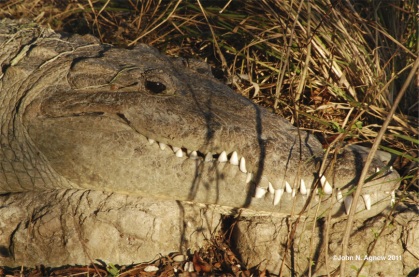 |
| An American Crocodile basking near the boat docks at Flamingo. |
I had paddled around in Nine Mile Pond in my inflatable kayak, on my
own and with a ranger-led group, and had scouted out a few likely scenes
to paint from the kayak. I had seen at least one large American
crocodile basking at the water’s edge, but he wasn’t in the vicinity of
where I was headed to paint. Not that I especially fear these crocs, but
I have a healthy respect for any predator several times my size.
 |
| A big croc basking on the shore of Nine Mile Pond |
So I loaded up my gear and shoved off, headed to a nicely formed
mangrove tree not far from the parking lot. As I rounded the corner near
the subject tree, I surprised a large croc that had been basking at the
base of my tree. He disappeared with a thrash and splash, and I figured
he was gone. I pulled into the channel near the tree, tied off the boat
and set up my easel.
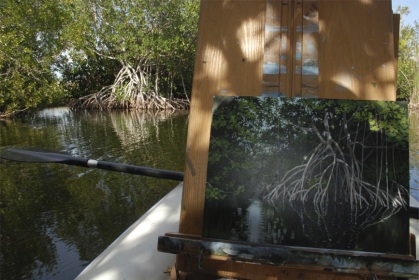 |
| Painting
from the kayak… the paddle is supporting the French easel, my palette
is in my lap. It’s a little tight, but comfortable enough. |
After I had been working for awhile, I heard the sound of a large
animal drawing a deep breath just behind me. I turned quickly to look
over my left shoulder, and caught a glimpse of the croc’s head diving
under the water. That was followed by a powerful thrust and splash from
the tail, which rocked me in the boat. Hmmm….
No, I don’t really believe the croc was stalking me. I had been
sitting very quietly painting in my boat, and the croc probably surfaced
nearby completely unaware of me until I turned my head and startled
him. If he had really been stalking me, I believe my sudden movement
would have stimulated an attack rather than flight. The only time a croc
made me nervous was the day before when I was scouting Nine Mile Pond. I
spotted a big croc basking and approached to get some photos. I kept a
respectful distance between myself and the croc, especially since he was
bigger than my boat. Even so, I seemed to upset him, and he launched
himself into the pond with a huge splash. He surfaced out in the middle,
and I took some photos of him swimming around. Eventually he seemed to
take notice of me again, but this time he seemed curious and began to
slowly close the distance between us. This time I backed off and headed
for other waters.
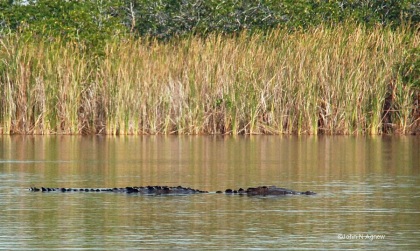 |
| An American Crocodile in Nine Mile Pond |
Crocodylus acutus does not have a reputation as a maneater, but it is
still a powerful predator, well equipped to dispatch a soft, pink meal
like myself. In my white inflatable kayak, I suppose I looked like a big
marshmallow with a pink, chewy center. There are places in the world
where I wouldn’t dare paddle around in such a flimsy craft with my body
so close to the water. Saltwater crocs (Crocodylus porosous) and Nile
Crocs (Crocodylus niloticus) are both very large species that would attack a mammal my size
without hesitation. It’s been suggested that acutus just doesn’t
normally have large mammals in it’s diet, so we don’t appear to them as a
prey item. Nile crocs, on the other hand, have been filmed grabbing
wildebeest and zebra by the nose, and tossing them over their back into
the water. A well known kayaker and trip leader was taken by a Nile
croc, right out of his kayak in the Zambesi River. Saltwater crocs have
been notorious as maneaters as well, taking people in southeast Asia
and Australia with some regularity.
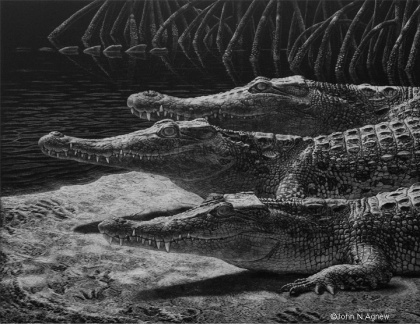 |
| ("Three
Young Salties" 11 x 14 scratchboard drawing) Crocodylus porosus will
grow into 6 meter monsters that take humans without hesitation. | |
Of course, alligators get to be huge predators as well, and they do
have a record of attacking folks occasionally in Florida. These are
usually situations where humans have tempted gators beyond their natural
aversion to eating people. Falling into the water near an alligator’s
mouth is one way to stimulate a feeding response, another is to splash
around among the gators in an area where people feed them. As more wild
lands turn into suburbia, gator-human conflicts become more common.
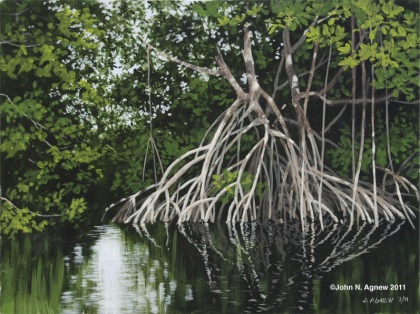 |
| “Nine Mile Mangrove” 9×12, acrylic on panel (plein aire) |







that was very interesting!!i know i would never have been as brave to kayak among gators to paint!!
ReplyDelete